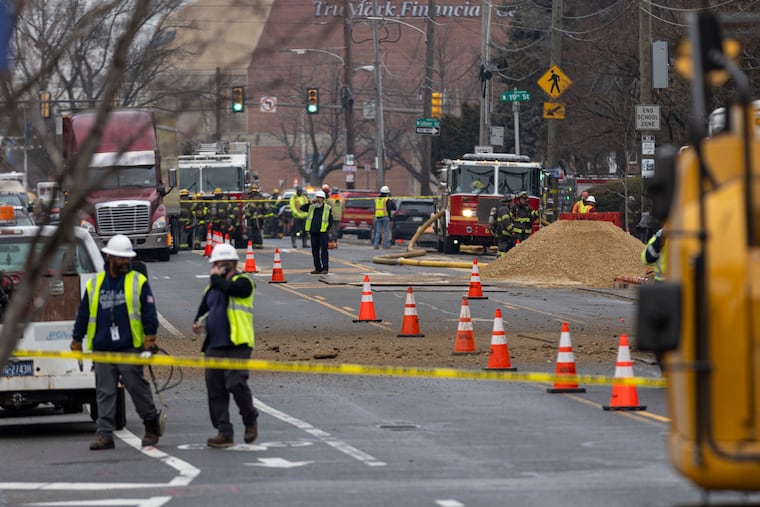PGW’s decaying infrastructure is a ticking time bomb beneath our streets
These disasters are not accidents. They are symptoms of PGW’s failure to prioritize safety over profit, leaving communities hostage to pipelines older than most grandparents.

On Feb. 27, a private contractor’s excavator struck a 20-inch gas main in the Ogontz section of Philadelphia, unleashing a geyser of methane that forced more than 2,300 students and staff at Central High School to flee. Miraculously, no one died — this time.
But the blast was no anomaly. It was the latest eruption from Philadelphia Gas Works’ (PGW) decaying infrastructure, a ticking time bomb beneath our streets.
Port Richmond residents know this terror all too well; a 2023 gas explosion there leveled homes and claimed a life. South Philadelphians endured similar devastation in 2019 and 2021. These disasters are not accidents. They are symptoms of PGW’s failure to prioritize safety over profit, leaving communities hostage to pipelines older than most grandparents.
PGW’s 3,046-mile gas distribution network — much of it rusting cast iron and unprotected coated steel — is a relic of the 19th century. Methane, the primary component of “natural gas,” is invisible and explosive. Leaks are inevitable, and combustion for heating and cooking poisons indoor air, disproportionately harming low-income families and communities of color.
Yet, PGW’s “solution” is to double down on the same dangerous system. The utility plans to spend as much as $8 billion over 35 years replacing pipes, a glacial pace that would lock Philadelphians into fossil fuel dependence until 2058 — eight years after the city’s carbon neutrality deadline. Worse, economist Dorie Seavey’s analysis reveals PGW’s per-mile costs for replacing pipelines are ballooning by 8.5% annually, which will further delay completion. This isn’t a plan — it’s a surrender to inertia.
Half-measures won’t stop the next explosion. PGW claims its pipe replacement program enhances safety, but the math doesn’t add up. Replacing 31 miles of mains annually in a system requiring 1,715 miles of upgrades means risking disaster for more than 50 years. Meanwhile, low-income ratepayers foot the bill with another 13% hike proposed this year. This isn’t just unsustainable — it’s unjust.
Seavey’s report offers a smarter path, suggesting the city prioritize replacing the pipelines at greatest risk of exploding, instead of meeting arbitrary mile quotas, and using advanced leak detection technology to better identify potential problems. The report also recommended investing in alternatives such as geothermal energy.
Yet, PGW has dragged its feet. In 2022, the city allocated $500,000 for a networked geothermal pilot project — a system that could heat homes using stable underground temperatures, eliminating gas reliance. Two years later, PGW hasn’t even released a feasibility study. This isn’t caution, it’s obstruction.
The Pennsylvania Constitution guarantees the right to “clean air, pure water, and the preservation of the natural environment.” These rights aren’t abstract — they demand that PGW and city leaders act as trustees of our collective safety.
Instead, they’ve chosen complacency. Every day they delay, Mayor Cherelle L. Parker and PGW gamble with lives. The Ogontz leak should be a wake-up call. When methane spewed into the air that day, residents weren’t just fleeing a possible fire — they were fleeing a system that values outdated infrastructure over their lives.
PGW’s pipe replacement plan is like repairing a sinking ship with duct tape. We need to build a new vessel.
Here is the best path forward:
Halt blank-check pipe spending. Instead, we must redirect PGW’s billions toward geothermal pilots, heat pumps, and retrofits for low-income homes.
Launch a community oversight board. Let frontline neighborhoods, not utility executives, guide the transition.
Enforce the constitution. Sue PGW and the city if they continue ignoring their duty to protect public health.
Philadelphia doesn’t have to choose between explosions and unaffordable bills. We can phase out methane, slash energy costs, and create green jobs — but only if we stop pretending 19th-century pipes can be patched into the future. The next explosion isn’t a question of if, but when.
Let’s make Ogontz the last warning we ignore.
Pamela Darville lives in Germantown. She’s a civil rights lawyer and cochair of POWER Interfaith’s Climate Justice and Jobs Team.